PRINCETON, NJ -- Democrats and Republicans retain markedly different views about global warming, with 75% of Democrats versus 40% of Republicans saying they personally worry about it a "great deal" or "fair amount." Both groups' levels of concern about global warming have fluctuated in recent years. Republicans -- as well as independents, at 59% -- show slightly increased levels of worry in 2013, following 10-year lows in 2010 and 2011. Concern has held steady at a high level among Democrats throughout the past decade.
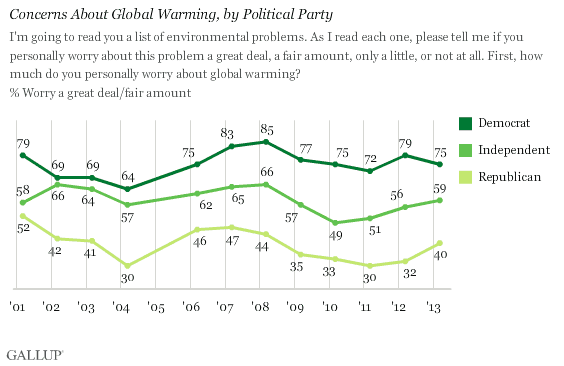
The same partisan pattern, with only slight variation, is seen across four other measures of views on global warming that Gallup tracks in its annual Environment poll, this year conducted March 7-10. As Gallup previously reported, that poll shows Americans' concerns about global warming rising slightly during the past two years.
Currently, two-thirds of Democrats, compared with 52% of independents and 39% of Republicans, say the effects of global warming have already begun to happen. Partisans were in roughly close agreement on this question in the late 1990s before diverging sharply in 2006 and 2008.
Since 2011, Republicans' views in particular have changed slightly; the percentage saying the effects of global warming have already begun increased to 40% in 2012 from 32% in 2011. Republicans' views on this issue are back to where they were during the George W. Bush administration.
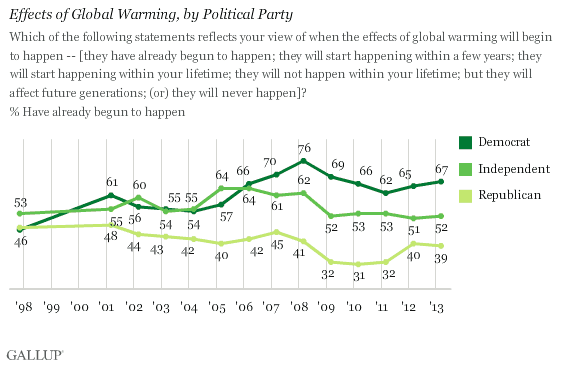
All party groups are now slightly more likely than in the recent past to believe that scientists agree global warming is happening. Nevertheless, differences remain, with 74% of Democrats, 58% of independents, and 52% of Republicans believing so. The percentage of Republicans who agree that scientists believe global warming is occurring is up significantly from 37% in 2011.
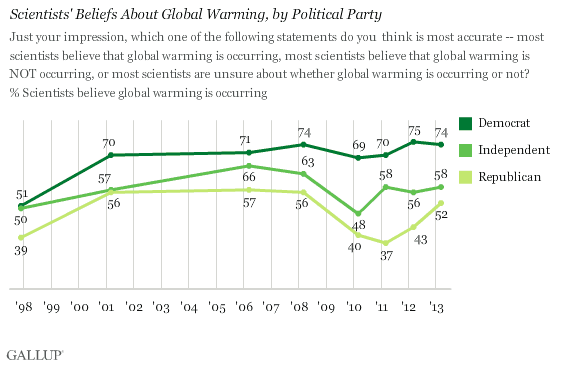
The partisan gulf on global warming is even starker in opinions about whether the rise in the Earth's temperature is due mainly to pollution from human activities or to natural changes in the environment unrelated to human activities. The majority of Democrats, at 78%, ascribe global warming to human activities, while 39% of Republicans agree -- a 39-percentage-point gap.
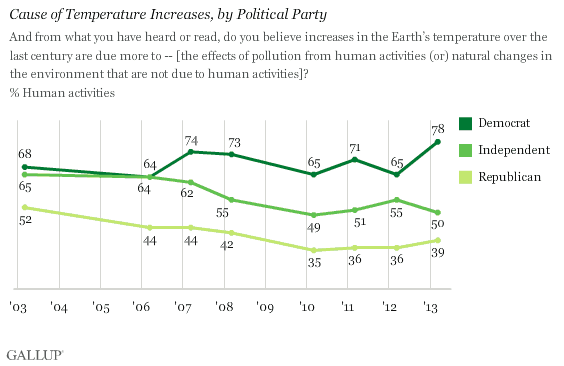
Similarly, Gallup finds a 32-point gap between the percentages of Democrats (50%) and Republicans (18%) who say global warming will pose a serious threat to them or to their way of life during their lifetime.
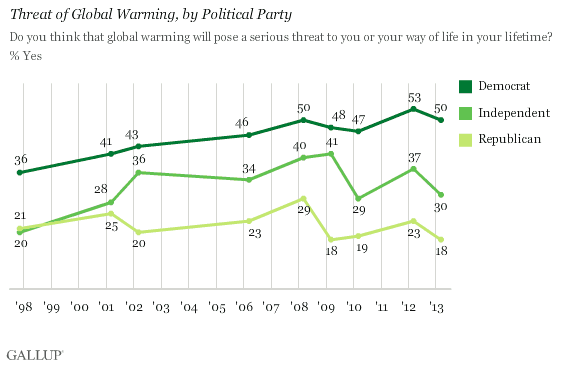
The sharpest partisan differences appear when respondents are asked whether the seriousness of global warming is generally exaggerated, underestimated, or correct as presented in the news. Nearly two-thirds of Republicans, 64%, say it is exaggerated, compared with 17% of Democrats -- producing a 47-point gap.
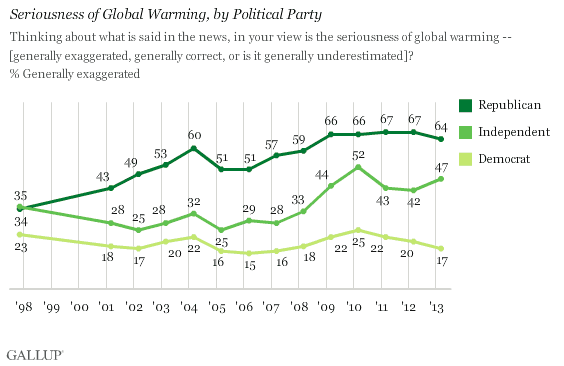
Bottom Line
While fundamentally a scientific matter, the global warming debate has taken on strong political overtones, with Democrats broadly accepting the validity of global warming research and Republicans generally dismissing it. Skeptics gained some footing in the last decade, when global warming dissenters in the scientific community garnered national attention at the same time that the validity of some prominent global warming research came under attack due to the "Climategate" leaked email scandal. Today, with those news stories fading, and 2012 setting records for high temperatures across the country, public concern is again heating up.
Survey Methods
Results for this Gallup poll are based on telephone interviews conducted March 7-10, 2013, with a random sample of 1,022 adults, aged 18 and older, living in all 50 U.S. states and the District of Columbia.
For results based on the total sample of national adults, one can say with 95% confidence that the maximum margin of sampling error is ±4 percentage points.
Interviews are conducted with respondents on landline telephones and cellular phones, with interviews conducted in Spanish for respondents who are primarily Spanish-speaking. Each sample of national adults includes a minimum quota of 50% cellphone respondents and 50% landline respondents, with additional minimum quotas by region. Landline telephone numbers are chosen at random among listed telephone numbers. Cellphone numbers are selected using random-digit-dial methods. Landline respondents are chosen at random within each household on the basis of which member had the most recent birthday.
Samples are weighted to correct for unequal selection probability, nonresponse, and double coverage of landline and cell users in the two sampling frames. They are also weighted to match the national demographics of gender, age, race, Hispanic ethnicity, education, region, population density, and phone status (cellphone only/landline only/both, cellphone mostly, and having an unlisted landline number). Demographic weighting targets are based on the March 2012 Current Population Survey figures for the aged 18 and older U.S. population. Phone status targets are based on the July-December 2011 National Health Interview Survey. Population density targets are based on the 2010 census. All reported margins of sampling error include the computed design effects for weighting.
In addition to sampling error, question wording and practical difficulties in conducting surveys can introduce error or bias into the findings of public opinion polls.
For more details on Gallup's polling methodology, visit https://www.gallup.com/.
